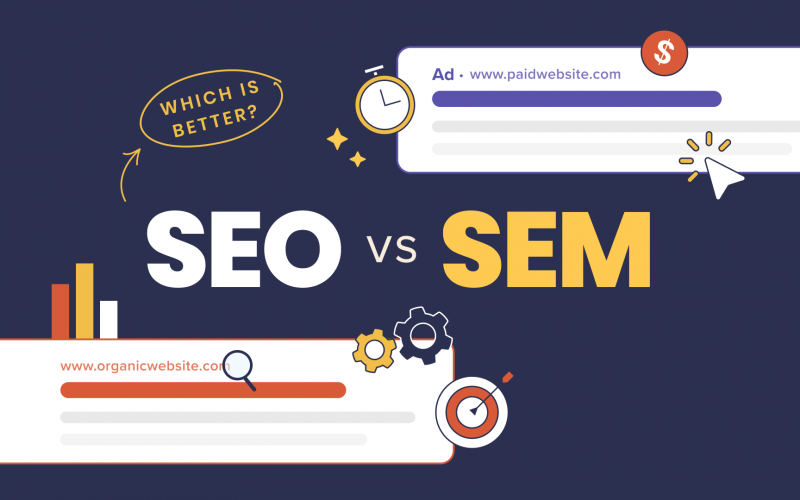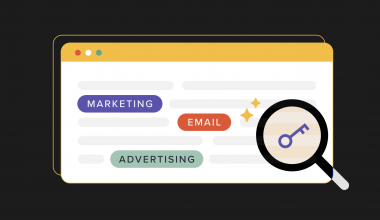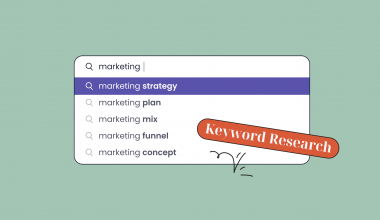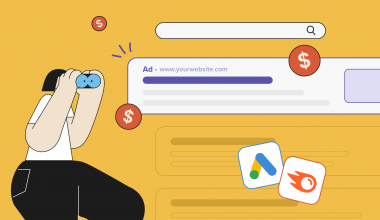It can be overwhelming and confusing for beginners to comprehend what SEM and SEO are. Digital marketers may briefly understand them, but knowing their ins and outs take a lot of time and effort.
However, fear no more! We’re here to make things simpler, and easier to digest for all of us, layman internet users and brand owners.
To break everything down, Search Engine Marketing (SEM) is a broad umbrella term that encapsulates all the strategies and techniques used to market one’s brand on search engines. Search Engine Optimization (SEO) is one part of SEM, which is an organic method of increasing web traffic by optimizing the website’s content and user experience. Pay-per-click (PPC) is another popular strategy of SEM that involves paying for ads to appear on the top of search engine result pages (SERPs).
Oftentimes, SEM can be referred to as PPC. In this article, we will compare SEM aka PPC and SEO and ultimately decide which is best to use under the different types of circumstances one faces.
Head over to our other articles to learn more deeply about SEO and SEM.
Speed
The first round of the battleground is speed.
When compare, SEM significantly takes up a shorter time than SEO to achieve the results. This is simply that SEO is a long-term strategy that should not be rushed about. According to a study, it takes around 2 months to a year to organically rank on the first page of Google. In fact, it will take even longer time if your website is new without any backlinks and content.
But, this shouldn’t discourage you! SEO can be a very fruitful investment if you know how to target keywords and implement the best practices.
Whereas SEM’s results can come instantaneously. If you win a bid, your ad can rank in first place very fast, getting you quality web traffics. However, there are also various factors that come into consideration when the search engine analyses your ad. Things like quality score, ad copy, keywords as well as your bid could largely affect the success of your ad campaign. Yet, the rule of thumb is that you’ll need to lay down a solid SEO foundation for your website first before achieving good results on your SEM campaigns.
Cost
The second round of the battle is the cost.
Now when we talk about the cost, we’ll have to keep in mind that nothing is free. One misconception of SEO is that it is completely free. Although in the long run, SEO is more affordable and cheaper than SEM, it requires an upfront investment of time, effort and skills.
To optimize a website, one needs various professionals to get the best result. For example, recruiting content writers to create quality content, web developers to optimize the website and UX designers to design responsive UI. Of course, it is possible for you to do all of these if you have sufficient knowledge, skill and time. Once you rank your website, the clicks will then be free. It is the ranking that takes up time and effort.
On the other hand, SEM requires you to pay for every click. If you stop paying, your traffic will go to zero. And for popular and high-in-demand keywords, you’ll have to bid in an auction to get targeted for it. The higher you bid, the higher chance you’ll get ranked for the keyword. With competition, comes a large number of expenses spend on getting the relevant keywords, which can be a burden for small businesses.
SEO or SEM: Which one should you use?
After learning what are SEO and SEM, many may be quick to jump to conclusions to use SEO as it is more affordable. But the most ideal solution is to use both in your digital marketing strategy because they serve different purposes in the marketing plan.
SEO is best used to target the audience that is in the top-of-the-funnel (TOFU).
This means targeting keywords that are informational, keywords that people use to search when they want to know and learn more, instead of to buy. These kinds of keywords do not work well with SEM because they rarely convert as people who search for them are not ready to buy.
For instance, you may target keywords with the question terms like “what”, “how”, “which” or “why”. The key objective in this stage is to create blog posts to educate and eventually convince readers that they might actually need your product or service.
Use SEM for keywords that are difficult to rank.
Generally, these keywords are those at the bottom of the funnel (BOFU) because they are widely used by large conglomerates and corporates. With these established competitors, it will be difficult to rank small businesses if you’re using SEO.
In this case, it is wise to target long-tailed keywords rather than short-tailed ones because they are more specific. For example, if you are a coffee shop in Ipoh, you may want to target “Ipoh white coffee” instead of “coffee”.
For real, if you really have to choose, which should you focus on?
Having said that, we understand not every business owners have the resources to execute both SEO and SEM at the same time. That being said, here are the instances when you should prioritize SEO or SEM according to the situations that you might be in.
Focus on SEO when
You have a limited budget. If you are a small business or a startup, you might have a tight marketing budget. That’s why it’ll be wise to use SEO instead of SEM which can burn a hole in your wallet.
You have time to spend. SEO and content marketing is a long-term strategy that can be fruitful. You’ll have to be patient and eventually, you’ll see the traffics coming in.
Focus on SEM when
You have a sufficient ad budget. Although you have the complete freedom to control your ad budget for SEM, you should have enough to sustain the campaigns for at least a period of time to go through all the trial and error. There is no one set of rules for SEM, so it really depends on your keyword targeting, quality score and bidding.
You know how to manage Google Ads (or any other search engine’s ad). PPC may seem simple and easy on the surface, but underneath is tons of keyword targeting, quality maintenance and data analysis to come out with the best decision for the ad campaigns.
You have a time-sensitive promotion. Since SEM is very time-effective, it works well when you have an urgent sale to promote on search engines.
All in all, it really depends on your own informed decision to choose to either do SEM and SEO or one of it. At the end of the day, you are your brand’s owner and you know what’s best for your business. If you require more information to weigh the advantages and disadvantages, read our other blogs on SEO and SEM.










